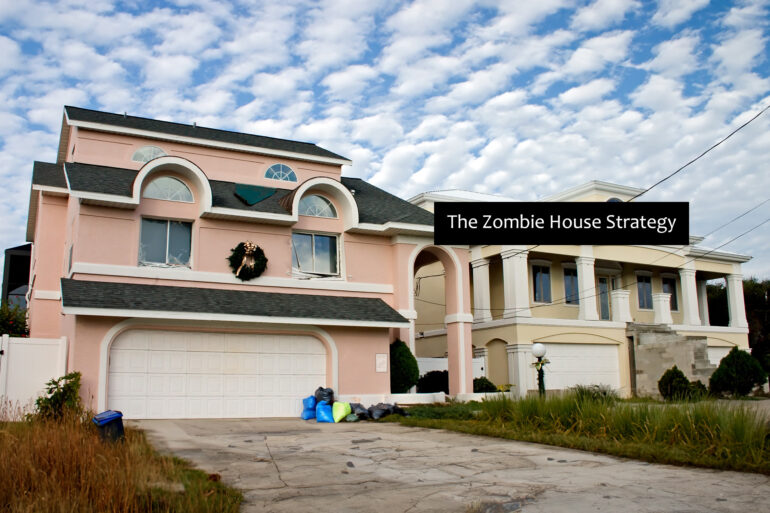Florida’s Zombie House Strategy
Cashing in on the Rise of Vacant and Walk-Away Houses
Introduction
Seasoned real estate investors are always on the lookout for unique opportunities to profit in the real estate market, and one that often piques their interest is vacant and walk-away houses. Many assume that a “zombie house” or vacant/abandoned home is a sign of distress, and often, they’re correct. However, it’s essential to understand the precise definitions of distressed and vacant houses, as recent data from housing market authority ATTOMDATA reveals a concerning trend—vacant houses are on the rise in several states, including an unexpected surge in Florida. In this article, we will explore why this phenomenon is occurring and how it presents an opportunity for those interested in purchasing zombie houses, which are essentially off-market discount houses.
For savvy investors and homebuyers, the surge in vacant houses presents a unique opportunity to acquire off-market discount properties.
About the Rise of Zombie Houses
The term zombie houses has gained prominence in recent years, especially since the end of the COVID-19 foreclosure moratorium in 2021. Since that pivotal moment, defaults and pre-foreclosures have skyrocketed, increasing by an alarming 185%. Over the past year alone, these distressing indicators have risen by 13%. This surge has brought the issue of vacant and walk-away houses to the forefront of real estate discussions.
Understanding the Distress and Vacancy Connection:
Before delving deeper into why vacant houses are on the rise, it’s crucial to understand the connection between distress and vacancies in the housing market. A vacant home often indicates a form of financial distress for the homeowner. This distress can be caused by various factors, including job loss, health crises, death, taxes, or economic downturns. When homeowners find themselves unable to meet their mortgage payments, some simply walk away from their properties, leading to vacancies.
Factors Contributing to the Surge in Vacant Houses:
Several factors have contributed to the recent increase in vacant houses, especially in states like Florida:
Foreclosure Moratorium: The lifting of the COVID-19 foreclosure moratorium in 2021 allowed lenders to resume foreclosure proceedings on properties with delinquent mortgages, contributing to the spike in distressed properties.
Economic Challenges: The economic fallout from the pandemic has left many homeowners struggling to make ends meet, increasing the likelihood of mortgage defaults and property abandonment.
Housing Condition: Some abandoned properties start off in need of repairs the homeowner can’t afford. This snowballs into a challenge where homeowners cannot sell their properties, or fix them, leaving them with no option but to vacate.

Thousands of houses nobody wants. According to the report, 1 in 79 houses in the U.S. are vacant with the number projected to rise in the near term. Of the 1.6 million vacant houses, 860,000 are in pre-foreclosure. That means, classic walk-aways: Homeowners who have either given up or passed away.
Here is the good, bad, and ugly of the zombie house data. The methodology means of data collection can be confusing. These zombie homes take effort to identify, research, ascertain the rightful owners, and analyze whether there is equity to achieve. The good news: confusing data is an opportunity for you! There are thousands of houses out there that no one wants, except, that is, for knowledgeable and experienced real estate investors with the right tools who can see the vision. Those that identify the best opportunities can quickly score the best deals.
These under-the-radar properties can lead to big discounts in prime locations without ruthless competition and bidding wars.
How to Get Involved
Seizing opportunities in the zombie house market means, first and foremost, finding these properties.

For savvy investors and homebuyers, the surge in vacant houses presents a unique opportunity to acquire off-market discount properties. These zombie houses can often be purchased at a significant discount compared to their market value. Investors can leverage their resources to renovate and revive these properties, turning them into profitable assets.
There are several secrets skilled investors use to locate vacant and zombie houses. To be sure, not all lists purporting to showcase vacant houses qualify as zombie houses. Vacant house reports are generated by the USPS daily, and this data is sold to list re-sellers. USPS measures any home not receiving mail as vacant. Experience shows the USPS list is only a small portion of the actual vacant home inventory. Here is one of many examples of why: Individuals receiving long-term medical care or living in a nursing home will often continue their mail at their primary residence, meaning that this home doesn’t report as vacant even though nobody is home. These under-the-radar properties can lead to big discounts in prime locations without ruthless competition and bidding wars.
Another insider trick is to know that houses with reverse mortgages, common in states such as Florida, could be sitting vacant for an extended period following the passing of the owner. Mail often continues for an extended time. These houses may not experience the beginning of foreclosure for a year or more after the passing of the owner, this is so common with reverse mortgages.
The very best zombie-house leads are estate or pre-probate houses. You can make a ton of money with these. The secret sauce is so simple, it’s called driving for probate dollars. It basically involves you, your friends, partners, or family going for a drive through neighborhoods that interest you. Overgrown lawns, boarded-up windows, and neglected exteriors can indicate a potential zombie property.
Once you find your list of zombie leads, get on your computer and start your laser-focused due diligence to find those certain clues that lead to the big money. This step of analyzing the leads isn’t difficult. You can do this yourself or teach a family member. First, look to discover what the issues are. Why is the home vacant or in disrepair? Here are some strategies. Start by checking local property records and tax records for properties with delinquent taxes or unresolved probate cases. These records may provide signs of abandoned or neglected properties.
Keep in mind that spotting zombie houses before anyone else can be an exciting proposition for various reasons. There may be legal and ethical considerations if you intend to purchase or rehabilitate one of these properties. Always ensure that you research the legal aspects, potential costs, and necessary permits before taking any action. On HOT leads, if you are about to spend money always order a PropertyOnion.com title search.
For those willing to navigate the complexities of distressed property acquisition, the zombie house market offers an exciting opportunity to invest in discounted off-market houses.
How to Find Zombie Houses. The INSIDER’S tricks of the trade.
Here are some tips on where to find zombie houses in Florida:
Urban Areas: Zombie houses are more commonly found in urban areas, where economic challenges or population shifts have left properties vacant. Look in neighborhoods within cities like Miami, Tampa, Jacksonville, or Orlando.
Foreclosure Listings: Check foreclosure listings on websites like PropertyOnion.com, Zillow, Realtor.com, or local real estate websites. Many zombie houses are the result of foreclosure proceedings.
Online Resources: Utilize online resources like PropertyOnion.com, real estate listing websites, property data services, or foreclosure listing platforms to search for properties in distress. Look for keywords like “vacant,” “foreclosure,” or “probate” in property descriptions.
County Property Records: Visit your county’s property appraiser’s office or check their website for property records. You can often find information on vacant properties, including their status and ownership.
Local News and Reports: Keep an eye on local news reports or articles that highlight abandoned properties or neighborhoods facing economic difficulties. Local newspapers and television news might have stories on this topic. The weekly obituaries are another great source.
Real Estate Agents/MLS data: Contact local real estate agents who may be aware of abandoned properties that are not yet listed on the market. They can also help you with the process if you’re interested in purchasing one.
City Government Resources: Some cities have programs or resources to address abandoned properties. Check with your city government or code enforcement office(website) for information on vacant home citations.
Word of Mouth: Talk to neighbors and residents. They may have information about abandoned properties in the area.
Finding zombie probate houses in Florida or any other location can be challenging because these properties are typically abandoned, distressed, and may not be actively listed on the market. Zombie properties are often associated with homeowners who have moved out but have not yet gone through foreclosure or the probate process.
Physically drive through neighborhoods and look for signs of abandoned properties.
PropertyOnion.com is always a useful resource.
Networking: Connect with local real estate professionals, including real estate agents, attorneys, and property managers. They may have insights into zombie properties or know of distressed homeowners looking to sell.
Direct Mail Campaigns: Consider running targeted direct mail campaigns to property owners in areas known for zombie properties. Express your interest in purchasing their property. For me, there is a secret to direct mail. The secret is to follow up on the returned mail. You will instantly know which houses are vacant based on USPS records, in real time.
Conclusion
The increasing number of vacant and walk-away houses is a concerning trend in the real estate market, driven by various factors, including the end of foreclosure moratoriums and the economic challenges of homeowners. However, for those willing to navigate the complexities of distressed property acquisition, the zombie house market offers an exciting opportunity to invest in discounted off-market houses. As the real estate landscape continues to evolve, keeping an eye on vacant properties could lead to valuable investments and potential financial gains.
To learn one-on-one thezombie, walk-away, and probate house strategies, take Bruce’s Probate Course. Bruce is accepting 3 students per month to mentor under him.








